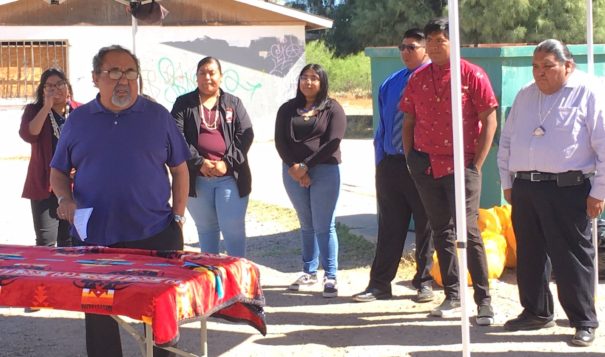News Article Article pages that do not meet specifications for other Trust Project Type of Work labels and also do not fit within the general news category.
Civilian Conservation Corps outreach to Native Youth: the Indian Youth Service Corps

This measure will help inspire a new generation of conservation leaders while improving our most treasured public spaces at the same time.
Senator Tom Udall
Thanks to the efforts of the late Senator John McCain and Senator Tom Udall, D-New Mexico, the Civilian Conservation Corps has created a new effort to benefit native Youth, the Indian Youth Service Corps.
Reminiscent of the Civilian Conservation Corps of the 1930s and 1940s, the 21st Century Conservation Service Corps, which is working to enhance public-private partnerships to engage youth and veterans in conservation-related restoration efforts.
The Civilian Conservation Corps, or CCC, lauded by many except in some Indigenous circles based on historical happenings, was a work relief program initiated by President Franklin Roosevelt that provided millions of young men with employment on environmental projects during the Great Depression.
Considered one of the most successful of Roosevelt’s New Deal programs, the Civilian Conservation Corps planted more than three billion trees and constructed trails and shelters in over 800 parks nationwide.
However, combined efforts of the Civilian Conservation Corps and the Bureau of Indian Affairs in the 1930s led to questionable tactics of thinning herds of animals in the Navajo Nation.
In 2019, the Civilian Conservation Corps is attempting to increase outreach courtesy of legislation initially co-sponsored by the late Arizona Senator John McCain and his New Mexico cohort, Sen. Udall, who introduced the measure to facilitate conservation service projects via cooperative agreements with participating federal agencies using existing funding.
While their bill strengthened the nation’s conservation corps and expanded the number of participating agencies that can develop conservation corps projects, it now has established a first-of-its-kind Indian Youth Service Corps so that Native youth could complete priority projects for the benefit of their tribes and communities.
“At a time when our public lands infrastructure badly needs repair and our outdoor spaces are more threatened than ever, young people, Native communities, and veterans are facing disproportionately high unemployment, and this measure will help inspire a new generation of conservation leaders while improving our most treasured public spaces at the same time,” said Udall.
Acting quickly after congressional approval, leaders of Arizona’s Tohono O’odham Nation announced the establishment of their own Indian Youth Corp project as part of the approved act. Both efforts are designed to put more than 25,000 vets and youth to work supporting the recreation, restoration, and natural resource economies of rural communities, strengthening infrastructure while providing job skills development for the participants.
Speaking at the Tohono O’odham celebration of the Indian Youth Corps program was Rep. Raul Grijalva, D-Arizona, chair of the House Natural Resources Committee, who told a crowd in the nation’s capital of Sells: “I’ve worked on this legislation for over a decade and I’m proud it’s finally a reality. We need to remember the historical connection between Native peoples and their land and to ensure this connection, conservation is key.

“This legislation recognizes that nexus between tradition and conservation. It reinforces its importance and helps train the next generation of tribal youth in developing conservation and sustainability habits on tribal lands and beyond. Our future is in good hands.”
Fellow Rep. Ruben Gallego, D-Arizona, chair of the subcommittee for Indigenous peoples of the United States, added his voice: “Indigenous communities have long led the way when it comes to responsible and compassionate stewardship of the land. That’s why working with Native communities and the next generation of tribal leadership is essential to learning how we can best preserve and protect our public lands.
“Establishment of the new Indian Youth Corps program is a chance to engage in that work while providing opportunities for leadership and job skills development for native youth.”
Speaking on behalf of The Corps Network, President/CEO Mary Ellen Sprenkel commented, “Launch of the Indian Youth Service Corps is an important development, not just for Native communities, but across the country where the Service and Conservation Corps annual engages some 1,200 Native youth in service on public and tribal lands. And with the introduction of the Indian Youth Service Corps, we hope to see that number grow as we guild partnerships and expand opportunities for Native youth to earn job skills while contributing meaningful service to their communities.”
Tohono O’odham National Chairman Edward Manuel and Vice Chair Vernon Jose were also on hand to offer comments and support.
“This new program gives our young people, and Native youth around the country, the tools they need to conserve the environment right in their own communities,” said Manuel. “Respect for the land and the responsibility to preserve it have always been important to O’odham values passed from generation to generation and with this legislation, our young people will now have the opportunity to put those values into practice on a scale not previously possible.”
Illustrative of the fact that actions can really speak louder than words, once the speeches had concluded, members of the Tohono O’odham Youth Council and the Corps Network service organization got down to business working with the Nation’s waste management and natural resources department to sort and process recycled items.
Lee Allen is a longtime contributor to Indian Country Today who resides and works in Tucson Arizona.
